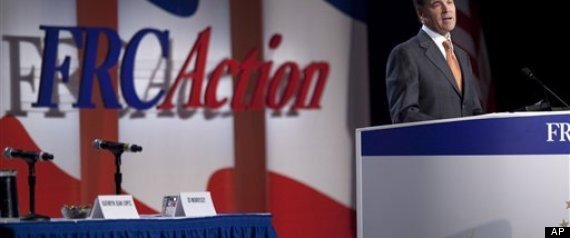 WASHINGTON -- Rick Perry opened a new front in the 2012 Republican presidential primary on Friday, implicitly questioning Mitt Romney’s pro-life authenticity in a speech to a few thousand socially conservative voters in the nation’s capital.
WASHINGTON -- Rick Perry opened a new front in the 2012 Republican presidential primary on Friday, implicitly questioning Mitt Romney’s pro-life authenticity in a speech to a few thousand socially conservative voters in the nation’s capital.The issue of Romney’s Mormon faith was also raised by a Texas pastor who suggested during his introduction of Perry that Mormons are not Christians, and then made the assertion explicitly to reporters after Perry’s speech.
Perry did not touch on Romney’s religion. He did not even mention Romney’s name, but openly went after the former Massachusetts governor for his past flip-flops on the abortion issue.
"For some candidates, pro-life is an election year slogan to follow the prevailing political winds. For me, it's about the absolute principle that every human being is entitled to life," Perry said, addressing the Values Voters Summit in the speaking slot just after lunch.
One of the loudest ovations during Perry's speech came at the mention of his decision to defund Planned Parenthood in Texas.
And Perry left the most aggressive attack on Romney to the man who introduced him, Rev. Robert Jeffress, pastor of First Baptist Church of Dallas. Jeffress called Perry "the most pro-life governor in the United States of America right now."
Jeffress also slyly played the Mormon card, hinting to the audience that because Romney is not an evangelical Christian -- he is a member of The Church of Jesus Christ of Latter Day Saints -- he is not as desirable a candidate for religious conservatives.
"In a few months, when the smoke has cleared, those of us who are evangelical Christians are going to have a choice to make," Jeffress said. "Do we want a candidate who is skilled in rhetoric, or one who is skilled in leadership? Do we want a candidate who is a conservative out of convenience, or one who is conservative out of deep conviction? Do we want a candidate who is a good moral person, or do we want a candidate who is a born-again follower of the Lord Jesus Christ?"
Perry, arriving on stage after Jeffress' introduction, said the pastor had "hit it out of the park."
In remarks to reporters after Perry's speech, Jeffress called the Mormon church "a cult," according to another reporter who was present.
Jeffress has made similar comments in the past.
"I believe we should always support a Christian over a non-Christian," Jeffress said in 2008. "The value of electing a Christian goes beyond public policies. ... Christians are uniquely favored by God, [while] Mormons, Hindus and Muslims worship a false god. The eternal consequences outweigh political ones. It is worse to legitimize a faith that would lead people to a separation from God."
Perry campaign spokesman Mark Miner told The Huffington Post, "The governor does not believe Mormonism is a cult," and said he was unaware of any official endorsement from Jeffress. Miner also stated that event organizers chose Jeffress to give the introduction, the campaign did not.
Perry also sought to shore up in his speech his weakest point to date: immigration. Perry suffered a self-imposed wound in his last debate when he said those who disagree with his support for in-state tuition to Texas universities for children of illegal immigrants "don't have a heart." He later apologized, saying the remark was "inappropriate."
On Friday, Perry said that as a border stage governor he has "lived and breathed this issue for over a decade," and listed the actions he has taken to crack down on illegal immigrants: a law to prevent them from obtaining drivers licenses and a law to require photo identification at the voting booth.
"I know firsthand the failures of our federal border policies, and I know the answer ... is not to grant amnesty to those who broke the laws to come into this country," Perry said.
The issue of in-state college tuition was not mentioned.
Origin
Source: Huffington
Romney, and any Mormon offended by being referred to as cultists, need to be asked why they adhere to a religion whose prophet, Joseph Smith, referred to Christianity, in general, as being cultic.
ReplyDeleteHe actually, claimed that God Himself referred to Christianity as “all wrong,” an “abomination,” “all corrupt” and “far from me”—this is the very foundation of the Mormon religion.
Pardon the spam-like URL but, see: http://www.examiner.com/messianic-jewish-in-national/rick-perry-on-robert-jeffress-mormonism-as-cult
Any faith-based organization or group is a RELIGION!!!
ReplyDeleteCult is a political term usually meant as a derogatory term and as a negative PR campaign meant by users (of the term) to elevate themselves by trampling over perceived opponents.
Religion has no place in politics!